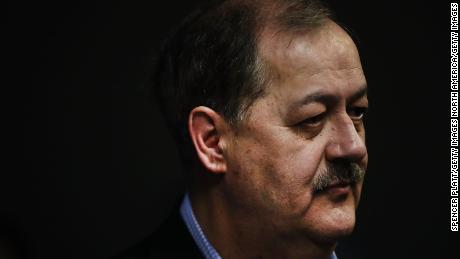begin quote from:
Trump has lost control of Trumpism
Washington (CNN)Donald Trump can't control Trumpism, if he ever could.
And the proof is in West Virginia, where, win or lose, the candidate who best represents the anger and frustration that put the President in the White House is the one the President is trying to stop.
Lots of Republicans, including Donald Trump Jr. and the President, are predicting Republicans will lose in West Virginia in November if Don Blankenship, the coal executive who served jail time and took up his Senate bid with an ax to grind, wins a three-way GOP primary Tuesday.
Trump never did any jail time, but he was the anti-establishment businessman with an ax to grind who upended the Republican primary.
Turning against Blankenship didn't stop the ex-con from continuing to tap into his "Trumpier than Trump" ethos.
Which leaves us with the strange scenario of the President who won the race no one thought he could win, fighting against his stylistic heirs who put the party in danger of losing elections everyone thinks it should win.
Democrats have great momentum heading into November, but Republicans have the map. They are defending just two seats CNN considers "toss-up" while Democrats are defending seven. Democrats will likely have to run the table and make gains in Republican territory to win the majority. They need more candidates like Blankenship and Roy Moore before him to win GOP primaries.
But it says something very important about the motivation of voters Trump tapped into and their sway in the GOP that Blankenship could very well win Tuesday night in West Virginia, and give Democratic Sen. Joe Manchin some more hope.
For Trump to be choosing between a mini-Trump and the Senate majority with an endorsement is not a new phenomenon. It also wouldn't be new for voters to pick the Trumpier candidate despite what the President asks them to do.
Trump wanted to support Moore from the beginning in Alabama's 2017 special election. But Senate Majority Leader Mitch McConnell, who is interested in staying Senate majority leader, and other establishment Republicans convinced the President to weigh in for the less Trumpian Sen. Luther Strange.
Moore won the Alabama primary anyway and Trump made clear he had preferred Moore at the outset. But then Moore imploded in the special election and a Democrat took the Senate seat. Sixteen months into his term, Trump is now all-in on preserving that Senate majority.
So Blankenship, who is running a race-baiting, conventions-be-damned campaign aimed at sticking a thumb in the eye of the establishment, hasn't gotten the slightest bit of warmth from the President who ran the exact same kind of campaign back in 2016.
And he's doing it in the state where Trump got his largest margin of victory in 2016 -- winning a whopping 68% of the vote and every single county.
When Gallup did a state-by-state assessment of Trump's approval rating, West Virginia was the place where he was most popular.
Still, Republicans fear that Blankenship could lose in a general election against Manchin, the moderate Democrat who has found a way to survive in coal country.
Republicans have had primary problems for much longer than Trump has been in politics and McConnell has had good years and bad years in controlling them.
Republicans were blessed with a wave of backlash to President Barack Obama in 2010 that gave them the House majority. But while Democrats lost six seats in the 2010 election, Republicans failed to take the Senate majority in large part because fringe candidates found their way onto the GOP slot in places like Nevada and Delaware, where they hoped to pick up seats.
Two years later, they had the chance at the majority again, but Democrats picked up two seats, winning in Maine after Republican Olympia Snowe got tired of polarization and decided not to run and Republican Richard Lugar, tainted by his relationship with Obama, was ousted by Richard Mourdock, who made outlandish and insensitive comments about rape. Democrat Joe Donnelly won in Indiana. And Missouri Democrat Claire McCaskill won that year, too, when challenger Todd Aiken, also not the preferred candidate in DC, made similarly insensitive comments about rape.
The lesson from Indiana and Missouri in 2012, and Alabama in 2017, is that Democrats can win in red states when there's an unpalatable candidate for Republicans on the ballot.
It was by learning that lesson that McConnell was able to, as then-CNNer Peter Hamby put it in a great 2014 essay, crush the tea party.
When McConnell told The New York Times' Carl Hulse in 2014 of tea party primary insurgents, "I think we are going to crush them everywhere," he did it. And they won the Senate majority that year.
Don't get me wrong -- Trumpism, as defined by the brash real-estate-tycoon-turned-President -- is different than the tea partyism, as defined by a slate of small-government grassroots upstarts, of the early 2010s. But the two are not unrelated. One begat the other. And they're both responsible for Republicans' great success and their challenges.
And McConnell and Trump may have to deal with the consequences.















No comments:
Post a Comment